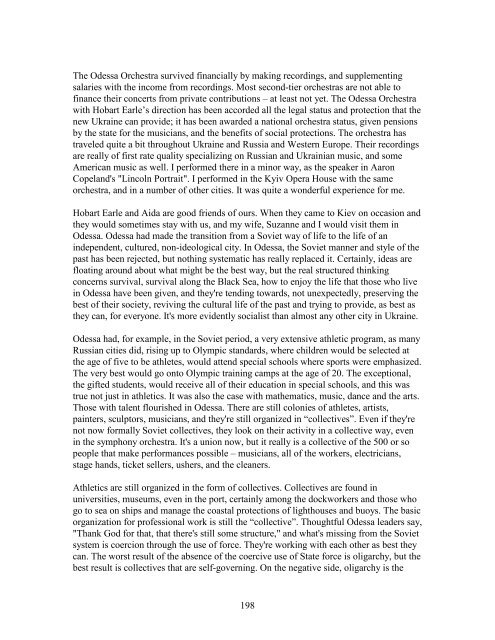1 The Association for Diplomatic Studies and Training Foreign ...
1 The Association for Diplomatic Studies and Training Foreign ...
1 The Association for Diplomatic Studies and Training Foreign ...
You also want an ePaper? Increase the reach of your titles
YUMPU automatically turns print PDFs into web optimized ePapers that Google loves.
<strong>The</strong> Odessa Orchestra survived financially by making recordings, <strong>and</strong> supplementing<br />
salaries with the income from recordings. Most second-tier orchestras are not able to<br />
finance their concerts from private contributions – at least not yet. <strong>The</strong> Odessa Orchestra<br />
with Hobart Earle’s direction has been accorded all the legal status <strong>and</strong> protection that the<br />
new Ukraine can provide; it has been awarded a national orchestra status, given pensions<br />
by the state <strong>for</strong> the musicians, <strong>and</strong> the benefits of social protections. <strong>The</strong> orchestra has<br />
traveled quite a bit throughout Ukraine <strong>and</strong> Russia <strong>and</strong> Western Europe. <strong>The</strong>ir recordings<br />
are really of first rate quality specializing on Russian <strong>and</strong> Ukrainian music, <strong>and</strong> some<br />
American music as well. I per<strong>for</strong>med there in a minor way, as the speaker in Aaron<br />
Copel<strong>and</strong>'s "Lincoln Portrait". I per<strong>for</strong>med in the Kyiv Opera House with the same<br />
orchestra, <strong>and</strong> in a number of other cities. It was quite a wonderful experience <strong>for</strong> me.<br />
Hobart Earle <strong>and</strong> Aida are good friends of ours. When they came to Kiev on occasion <strong>and</strong><br />
they would sometimes stay with us, <strong>and</strong> my wife, Suzanne <strong>and</strong> I would visit them in<br />
Odessa. Odessa had made the transition from a Soviet way of life to the life of an<br />
independent, cultured, non-ideological city. In Odessa, the Soviet manner <strong>and</strong> style of the<br />
past has been rejected, but nothing systematic has really replaced it. Certainly, ideas are<br />
floating around about what might be the best way, but the real structured thinking<br />
concerns survival, survival along the Black Sea, how to enjoy the life that those who live<br />
in Odessa have been given, <strong>and</strong> they're tending towards, not unexpectedly, preserving the<br />
best of their society, reviving the cultural life of the past <strong>and</strong> trying to provide, as best as<br />
they can, <strong>for</strong> everyone. It's more evidently socialist than almost any other city in Ukraine.<br />
Odessa had, <strong>for</strong> example, in the Soviet period, a very extensive athletic program, as many<br />
Russian cities did, rising up to Olympic st<strong>and</strong>ards, where children would be selected at<br />
the age of five to be athletes, would attend special schools where sports were emphasized.<br />
<strong>The</strong> very best would go onto Olympic training camps at the age of 20. <strong>The</strong> exceptional,<br />
the gifted students, would receive all of their education in special schools, <strong>and</strong> this was<br />
true not just in athletics. It was also the case with mathematics, music, dance <strong>and</strong> the arts.<br />
Those with talent flourished in Odessa. <strong>The</strong>re are still colonies of athletes, artists,<br />
painters, sculptors, musicians, <strong>and</strong> they're still organized in “collectives”. Even if they're<br />
not now <strong>for</strong>mally Soviet collectives, they look on their activity in a collective way, even<br />
in the symphony orchestra. It's a union now, but it really is a collective of the 500 or so<br />
people that make per<strong>for</strong>mances possible – musicians, all of the workers, electricians,<br />
stage h<strong>and</strong>s, ticket sellers, ushers, <strong>and</strong> the cleaners.<br />
Athletics are still organized in the <strong>for</strong>m of collectives. Collectives are found in<br />
universities, museums, even in the port, certainly among the dockworkers <strong>and</strong> those who<br />
go to sea on ships <strong>and</strong> manage the coastal protections of lighthouses <strong>and</strong> buoys. <strong>The</strong> basic<br />
organization <strong>for</strong> professional work is still the “collective”. Thoughtful Odessa leaders say,<br />
"Thank God <strong>for</strong> that, that there's still some structure," <strong>and</strong> what's missing from the Soviet<br />
system is coercion through the use of <strong>for</strong>ce. <strong>The</strong>y're working with each other as best they<br />
can. <strong>The</strong> worst result of the absence of the coercive use of State <strong>for</strong>ce is oligarchy, but the<br />
best result is collectives that are self-governing. On the negative side, oligarchy is the<br />
198
















